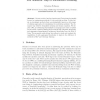Free Online Productivity Tools
i2Speak
i2Symbol
i2OCR
iTex2Img
iWeb2Print
iWeb2Shot
i2Type
iPdf2Split
iPdf2Merge
i2Bopomofo
i2Arabic
i2Style
i2Image
i2PDF
iLatex2Rtf
Sci2ools
149
click to vote
ESWS
2010
Springer
2010
Springer
The Semantic Gap of Formalized Meaning
Recent work in Ontology learning and Text mining has mainly focused on engineering methods to solve practical problem. In this thesis, we investigate methods that can substantially improve a wide range of existing approaches by minimizing the underlying problem: The Semantic Gap between formalized meaning and human cognition. We deploy OWL as a Meaning Representation Language and create a unified model, which combines existing NLP methods with Linguistic knowledge and aggregates disambiguated background knowledge from the Web of Data. The presented methodology here allows to study and evaluate the capabilities of such aggregated knowledge to improve the efficiency of methods in NLP and Ontology learning. 1 Problem Decades of research have been spent on answering the question “How can we teach machines to understand natural language?” and the unanimous response is: It is impossible (for obvious reasons). Any approach that indulges in formalizing the meaning of natural language face...
ESWS 2010 | Human Cognition | Internet Technology | Meaning Representation Language | Semantic Gap |
Related Content
| Added | 25 Jan 2011 |
| Updated | 25 Jan 2011 |
| Type | Journal |
| Year | 2010 |
| Where | ESWS |
| Authors | Sebastian Hellmann |
Comments (0)

